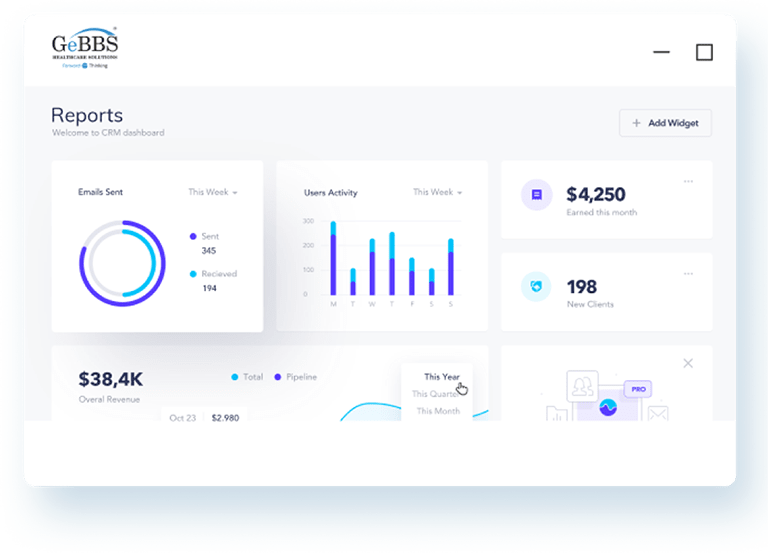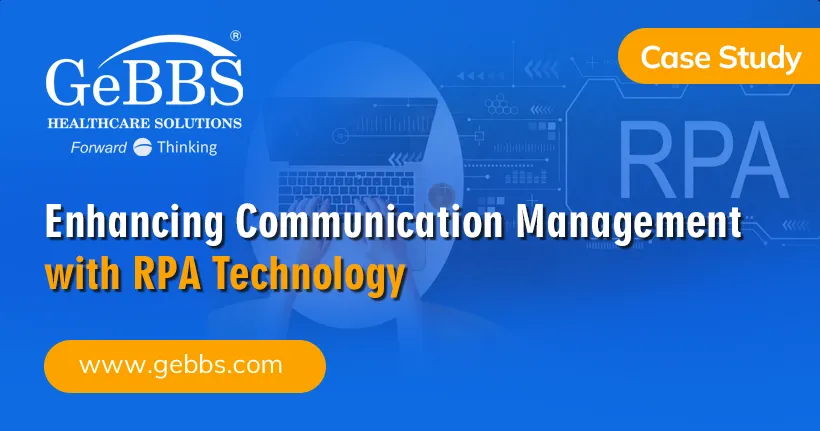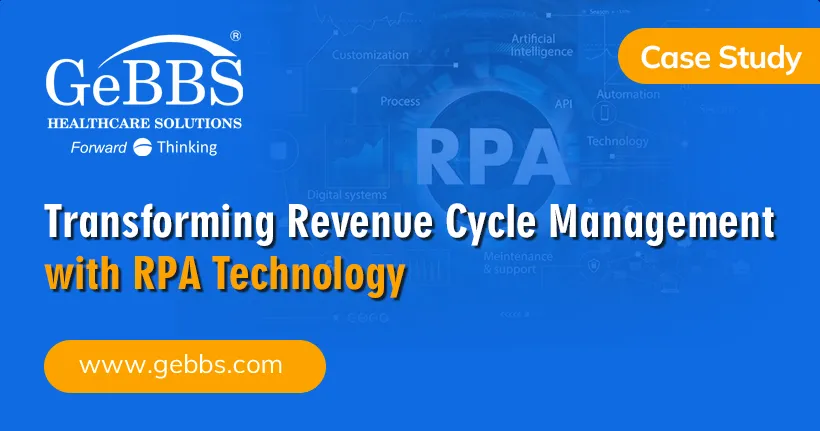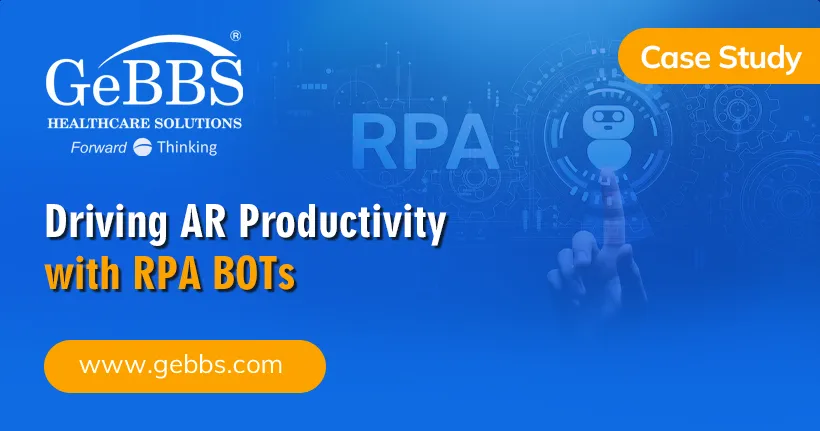- In Demo entry and Insurance verification with 30 Bots deployed. This has enhanced the efficiency and productivity.
- 40 Bots for different processes of denial management, status, ERA, Download, EOB Text Extraction
- For Payment Posting and Charge entry scenarios, 12 Bots have been deployed
- 04 Appeal Bots “Anyone can appeal” for different payers
- Home
- Technology
- RPA
Automation Solutions That EnhanceProductivity and Quality
GeBBS’ RPA strategy involves a strong focus on identifying process gaps and implementing workflow optimization measures. We offer extensive RPA process automation solutions to improve employee satisfaction and reduce errors.
Robotics are being adopted in healthcare to improve aspects of patient care. Robotic process automation (RPA) challenges organizational leaders and stakeholders to think beyond the antiquated human-centric approach to other areas of healthcare like coding and administrative processes.
GeBBS SUCCESSFUL RPA DEPLOYMENTS
RPA uses a set of rules and algorithms to complete repetitive tasks that are prone to errors. RPA is a healthcare automation solution that helps reduce manual data entry, assists with pre-authorizations, automates simple claim denials, and improves the customer experience through chatbots.
Show More
HOW GeBBS USES BOTS

Data Migration and Validation
Assists in data migration from one PMS to another. Field-by-field mapping and data transfer verification. Benefit : $16K per year and $51 per year

Refund Packet
Auto-sequence and merge refund packets and upload them to the end system.
Benefit : 35-40% saving on efforts
$17K per year

Clearing House
Download ERA from the clearinghouse and process the ERA data into the system.
Benefit : $37K per year

EOB Text Extraction
Auto extract data (patient information, etc.) from the EOBs.
Benefit : 30-35% effort reduction
$233K per year
Snapshot of bussiness functionality Our Automation Platform


Automation’s Potential in Healthcare System RCM
Claims Processing
Data Entry
Error Mitigation
Real Time Analysis
Resource Allocation
Claims Processing
- There is much more to this than simply submitting a request to a payer for payment, as health system leaders know all too well.
- Efficient RCM requires proper processing of vendor applications, patient insurance information and eligibility, accurate forms, expedited benefits retrieval, and accurate medical billing codes, to name a few.
- Automation can alleviate the strain these processes place on staff with programming that verifies assets from start to finish, and with shorter TATS than ever before.
Data Entry
- When humans enter data into your system, it is susceptible to mistakes.
The margin for error is too high, whether it’s patients filling out forms or office staff entering details from clipboards and paper.
- Data entry errors result in processing and payment delays.
- RPA can introduce patient portals (eliminating illegible handwriting), identify errors (resulting from mismatched information), and cut staff time in half (removing manual data entry).
Error Mitigation
- Issues like incorrect pre-authorization requests, non-standardized data entry, and coding errors can go unchecked and cause bottlenecks in your workflows.
The result can be haphazard and inconsistent data that slows progress, misleads decision-makers, and interrupts patient care outcomes.
- Our insightful data solutions preemptively tackle these issues so that you get a seamless and intuitive experience across your organization.
Real Time Analysis
With the rush to go digital and virtual, more companies—and health networks—struggle with incompatible and disparate technology systems.
- RPA can tie these systems together to streamline reporting. Not only does this reduce errors and redundancies, but it also gives leaders real-time insight into revenue, claim denials, and overall business health.
Resource Allocation
- Automation will help free up the time and attention of healthcare administrative teams and promote a smarter work culture.
These highly skilled workers, who understand your business model and patient demographics, can be reallocated to higher-level tasks that benefit from their experience and insights.
Rather than filing hundreds of claims or keying in form data, they can connect with patients, resolve issues, and make a larger impact with their true talents.
Learn how Automation has Helped Healthcare Organizations
Insights
Insights
News
Blog
Insights
Enhancing Communication Management with RPA Technology
Enhancing Communication Management with RPA Technology Up to $300K Saved Per Year 50% Reduction in Claim Processing Delays 90% Reduction
Transforming Revenue Cycle Management with RPA Technology
Transforming Revenue Cycle Management with RPA Technology $30M in Direct Adjustments Processed in Just 2 Weeks 300% Increase in Productivity 50%
Driving AR Productivity with RPA BOTs
Driving AR Productivity with RPA BOTs 3-5x Productivity Boost 40-50% Faster Claim Processing $150K+ Annual Cost Savings Overview A
News
- 2024 IAOP® Global 100 Outsourcing List
- 978 Reads
- 154 Shares
- News
- 1476 Reads
- 352 Shares
Blog
- direct to provider contracting
- 786 Reads
- 145 Shares
- Revenue Cycle Management
- 776 Reads
- 333 Shares
Get in touch with GeBBS and enhance your financial outcome








